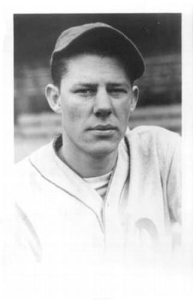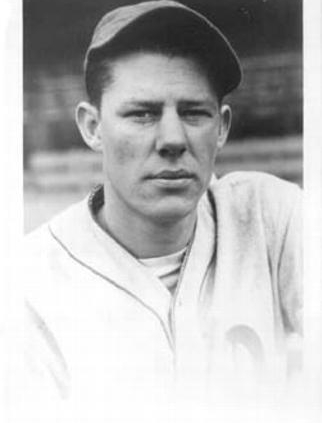September 13, 1942: Ted Williams, Red Sox rally with big 7th inning against Buck Ross, White Sox
 The first game of the Sunday doubleheader at Comiskey Park was a close, well-played, low-scoring affair until everything suddenly fell apart for the hosting Chicago White Sox.
The first game of the Sunday doubleheader at Comiskey Park was a close, well-played, low-scoring affair until everything suddenly fell apart for the hosting Chicago White Sox.
Starting for the White Sox was Buck Ross, a 27-year-old veteran wrapping up his seventh year in the big leagues. The North Carolina native was 5-5 coming in the game with a 4.68 ERA, playing under manager Jimmy Dykes for a sixth-place team with a losing record.
The Boston Red Sox were pretty well set in second place in the American League standings, nine games behind the New York Yankees and 10 ahead of the third-place St. Louis Browns. Working the mound for them was 24-year-old left-hander Bill Butland. He’d pitched in three games for the Red Sox in 1940, developed a sore arm, spent 1941 with Double-A1 Louisville, and then come back to Boston, where he was having quite a good year. He came into the game with a 2.36 earned-run average. A member of the bullpen earlier in the 1942 season, the product of Terre Haute, Indiana, had joined the starting rotation on August 6 and won every one of his six starts, two of them shutouts.
The three Red Sox batters whom Ross faced in the top of the first all made outs. Right fielder Wally Moses singled for the White Sox in the first, but the other three batters all made outs.
In the second inning, Boston first baseman Tony Lupien singled, but right fielder Lou Finney hit into a double play. The White Sox mounted a threat in their half when left fielder Myril Hoag led off with a double, and center fielder Bill Mueller singled. Skeeter Webb made an out, though, the runners unable to advance, and George Dickey hit into a 4-6-3 double play.
The White Sox did get a run in the third. With one out, Red Sox third baseman Skeeter Newsome committed an error, and Chicago first baseman Don Kolloway reached safely. Moses walked, and there were two aboard. Moses was forced at second by third baseman Jimmy Grant, but Kolloway reached third on the play. He scored easily when shortstop Luke Appling singled to left field. Hoag struck out, but it was 1-0, White Sox.
That’s where it stood after three more innings.
Dom DiMaggio walked for Boston to lead off the fourth, but Johnny Pesky struck out and Ted Williams grounded into a 3-6-3 double play. The White Sox went down in order in their half.
Ross got the Red Sox out in order in the fifth. He led off in the bottom of the inning by drawing a walk, but an unproductive out and a double play ended that inning.
Similarly, the only Red Sox batter to reach base in the Boston sixth was the pitcher, Butland, also on a walk. Dario Lodigiani had come into the game for Chicago after the fourth, playing third base in place of Grant. He led off in the White Sox sixth, but he, Appling, and Hoag all made outs.
After six innings, the score remained White Sox 1, Red Sox 0. To this point, the White Sox had just three base hits, while Ross had held the Red Sox to only one, the single by Lupien in the second.
Suddenly, everything changed in the top of the seventh. Pesky, on his way to placing third in the American League MVP voting as a rookie, led off with a single to center field.
Williams took two strikes, then a ball. On Ross’s fourth pitch, Williams “spanked it wickedly to right, against an appreciable cross wind, into the fifth row of the lower grandstand.”2 The Red Sox had gone ahead, 2-1.
Lupien collected another hit, a double to left-center, and took third when Finney singled. Second baseman Bobby Doerr hit into a force play at second base but ran hard to first and prevented the double play, as Lupien scored Boston’s third run. Back-to-back singles by Newsome and catcher Johnny Peacock brought Doerr home for a 4-1 Red Sox lead.
At this point, after six hits and four runs, Dykes called on Joe Haynes to relieve Ross. With runners on first and second and one out, Butland bunted, a successful sacrifice advancing both baserunners.
Dom DiMaggio came up to hit. Haynes needed to get the final out and get out of the inning. He threw a wild pitch, though, and Newsome scored. Then he threw another wild pitch, and Peacock scored. The two baserunners had both made it home. DiMaggio ultimately was called out on strikes, but the score was now 6-1 in Boston’s favor.
Butland shut down the White Sox in the bottom of the seventh. In fact, the game resumed its low-scoring pace. Only one batter for either team reached base, Ted Williams on a one-out walk in the top of the eighth. All the other batters for both teams made outs.
It was the Williams home run that had given the Red Sox the lead and proved decisive. There had been a loud fan heckling Williams over the first six innings, but the home run seemed to quiet him down.3 The ball Williams had hit struck a fellow Navy man (Williams and Pesky had both already enlisted in the Navy) in the face, as Lt. Earl Newman had tried to catch it. The ball fell into the lower right-field stands. Newman’s cheek was cut and he had to go to Mercy Hospital for examination. The Boston Traveler said he lost two teeth.4
The Red Sox also won the second game, 5-0. Pesky added two more hits; he was now at 197 for the season. He ended with 205, leading both leagues. For Williams, who had turned 24 years old in August, it was his 32nd home run of the year. He hit four more before the season was over. This was his first Triple Crown year, leading both leagues in home runs (36), runs batted in (137), and batting average (.356).
With the win, Butland had won his seventh game in his last seven starts, one win against each of the other American League ballclubs. He finished the 1942 season with a 7-1 record, then enlisted in the Army in December 1942 and did not return to professional baseball until spring training in 1946. After a handful of appearances with the Red Sox in 1946 and 1947, his major-league career was over.
Acknowledgments
This article was fact-checked by Thomas J. Brown Jr. and copy-edited by Len Levin.
Photo credit: Trading Card DB.
Sources
In addition to the sources cited in the Notes, the author consulted Baseball-Reference.com and Retrosheet.org, and game accounts in both the Boston Globe and Chicago Tribune.
https://www.baseball-reference.com/boxes/CHA/CHA194209131.shtml
https://www.retrosheet.org/boxesetc/1942/B09131CHA1942.htm
Notes
1 Starting in 1946, AA (Double A), the highest minor-league classification, became AAA, or Triple A.
2 Burt Whitman, “Hose Win Pair, Ted Hits No. 32,” Boston Herald, September 14, 1942: 13.
3 His name was “Iron Lung” Burke and he was from Toledo. Williams laughed at some of the antics and after his home run he “made an elaborate bow and doffed his cap to the balcony hecklers as he crossed the plate.” Edgar Munzel, “Sox Drop Pair to Boston, 6-1, 5-0,” Chicago Sun, September 14, 1942: 15, 17.
4 Fred Knight, “Freak Accidents Enliven Red Sox Week-end Games,” Boston Traveler, September 14, 1942: 25.
Additional Stats
Boston Red Sox 6
Chicago White Sox 1
Comiskey Park
Chicago, IL
Box Score + PBP:
Corrections? Additions?
If you can help us improve this game story, contact us.


